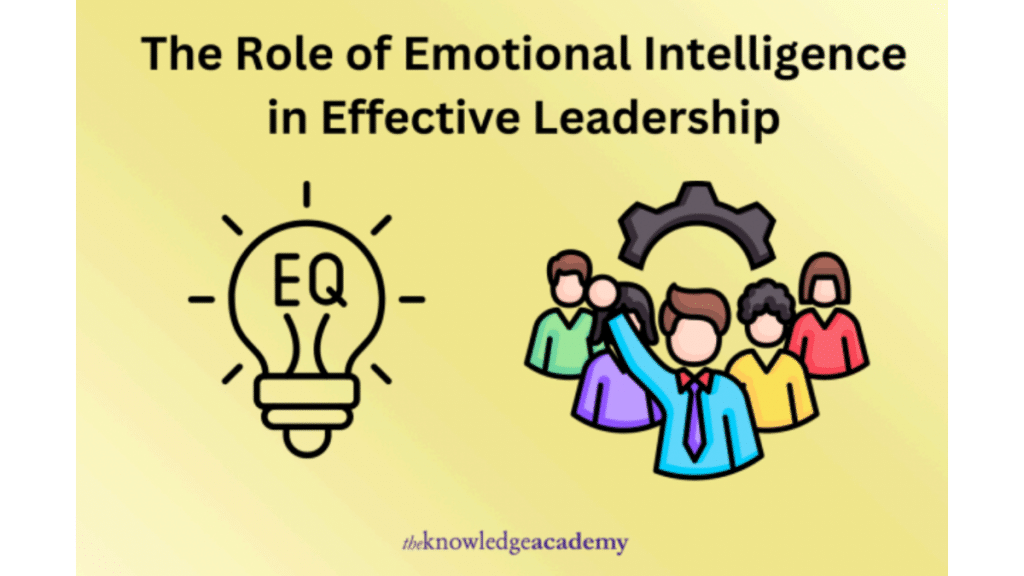What are Leadership Qualities Emotional intelligence, vision, integrity, and the capacity to uplift and inspire people are characteristics of a leader. The basis of every successful organisation is excellent leadership. For teams to overcome obstacles and propel an organisation to success, these qualities are crucial. Many professionals look to Leadership Training Courses to develop these talents because they provide insightful analysis and doable strategies for improving leadership abilities.
This blog explores the significant influence of emotional intelligence on good leadership and provides methods for developing this essential ability.
Understanding Emotional Intelligence
Five essential elements make up emotional intelligence motivation, empathy, self awareness, self-regulation, and social skills. Every one of these elements helps a leader successfully negotiate difficult interpersonal relationships, inspire and encourage teams, and drive an organisation forward.
The Impact of Emotional Intelligence on Leadership
Many aspects of leadership, including team dynamics and organisational culture as well as decision-making, are greatly influenced by emotional intelligence. Here’s a closer look at how EI impacts these critical areas:
Enhanced Decision-Making
Highly emotional intelligent leaders approach decision-making with balance. They can:
● Recognise Emotional Bias: Emotionally intelligent leaders know when their feelings may be affecting their judgements since they are self-aware. They can then stand back, examine the matter more rationally, and make more logical decisions because of this realisation.
● Empathy in Decisions: These leaders think through how their choices may affect stakeholders and team members socially and emotionally. Through empathy for others, they make sure that their choices are just and respectful, which can improve acceptance and facilitate easier execution.
● Stress Management: Leaders with emotional intelligence are better able to control stress and keep their heads clear under duress. This capacity is essential to making planned, not reactive, judgements in high-stress situations.
Positive Organisational Culture
Employee happiness, results, and the general success of a company are all greatly influenced by its culture. Emotionally intelligent leaders contribute to a positive organisational culture in several ways:
● Modeling Desired Behaviors: High emotional intelligence leaders demonstrate traits like respect, empathy, and teamwork. Their acts created a benchmark for the rest of the company and inspired comparable conduct from every employee.
● Fostering Inclusivity: By appreciating many viewpoints, these leaders foster an inclusive atmosphere in which every employee feels important and included. Morale is raised and a feeling of community is promoted by this inclusivity.
● Promoting Well-Being: Emotionally intelligent leaders are aware of the welfare of their subordinates. They give resources and support to assist staff members in preserving a good work-life balance and are aware of the warning indicators of stress. This focus on health lowers absences and raises job satisfaction.
Enhanced Employee Engagement and Performance
Performance of an organisation is mostly determined by employee engagement. Leaders with high emotional intelligence:
● Inspire and Motivate: Emotionally intelligent leaders inspire and encourage their team members by their grasp of personal motivations and their capacity for interpersonal connection. Higher degrees of dedication and involvement to organisational goals emerge from this.
● Provide Constructive Feedback: Development requires feedback. High emotional intelligence leaders assist staff members get better without making them feel less worthy. They do this by providing helpful, encouraging criticism. Using this strategy promotes an attitude of ongoing development.
● Recognise and Reward: Through acknowledging the contributions and accomplishments of their team members, emotionally intelligent leaders establish a constructive feedback loop. Motivated and performing employees feel valued and appreciated.
Strengthened Organisational Resilience
These days, organisations must deal with a lot of problems and changes. Resilience of an organisation is greatly enhanced by emotionally intelligent leaders since they:
● Changing with the times: These leaders are more adept at managing both their own and their staff members’ changes. They can handle their feelings and worries well, which helps them make transitions smoothly and keep team morale high.
● Creating a Supportive Environment: When things are confusing, emotionally intelligent leaders offer the assurance and support required to keep teams engaged and unified. Their sympathetic style gives staff members confidence in the future.
● Fostering Innovation: Emotionally intelligent leaders foster creativity by making the workplace comfortable for staff members to take chances and exchange ideas. Sustainability of an organisation depends on this flexibility and readiness to accept new concepts.
Building Long-Term Relationships
Long-term connections with team members, stakeholders, and customers are just as important to successful leadership as meeting short-term objectives. Emotionally intelligent leaders excel in this area by:
● Developing Trust and Loyalty: By means of frequent, sympathetic exchanges, these leaders establish solid, trust-based bonds. Stakeholders and team members are more inclined to stick with leaders that care about their success and well-being.
● Effective Networking: One essential aspect of emotional intelligence, social skills, help leaders create and sustain a wide range of contacts. These networks can be quite handy for teamwork, problem-solving, and taking advantage of fresh prospects.
● Enhancing Customer Relationships: Emotionally gifted executives are aware of the value of retaining and satisfying customers. Their capacity to relate to consumers and satisfactorily meet their requirements fortifies such relationships and propels company growth.
Conclusion
Beyond being an invaluable asset for leaders, emotional intelligence is necessary to successfully negotiate the complexity of contemporary corporate life. Decision-making, team dynamics, organisational resilience, employee engagement and performance, and long-term relationships can all be improved by leaders who make an emotional intelligence investment.
Emotional intelligence will become even more crucial to effective leadership as the corporate world develops.
Developing EI just got easier by attending The Knowledge Academy Courses!
